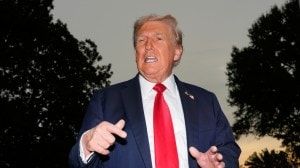Bush’s change in Iran policy ignites debate
The Bush administration’s decision to abandon a long-held policy and meet with a top Iranian official on that country’s nuclear programme...

The Bush administration’s decision to abandon a long-held policy and meet with a top Iranian official on that country’s nuclear programme has intensified the political debate in Washington about how best to deal with America’s adversaries.
The White House decision was hailed on Wednesday by Barack Obama, who has blasted Republican rival John McCain and President Bush for spurning high-level talks with Iran in the past. Obama said the US should “stay involved with the full strength of our diplomacy”.
Administration officials disclosed on Tuesday that Undersecretary of State William J Burns would join a delegation from five other world powers to meet with Iranian nuclear envoy Saeed Jalili in Switzerland on Saturday. US officials and their allies hope Iran announces a decision on a proposed package of political and economic incentives in return for abandoning its nuclear ambitions.
The move marked a distinct shift from the administration’s position that it would take part in talks with Iran only if the Islamic regime first suspended uranium enrichment activities, which US officials charge are intended to produce a nuclear bomb, but which Iran insists are for peaceful energy production purposes.
Democrats interpreted the White House move as one that provided new support for Obama’s approach, but the McCain campaign saw it differently. In a statement, McCain foreign policy aide Randy Scheunemann suggested that Bush’s move was the kind of “multilateral diplomacy” McCain supports.
“Senator McCain believes working with our allies presents the best chance to increase the consequences should Iran continue its defiance of the international community,” the statement said, criticising Obama for proposing what Scheunemann called “preemptive concessions”.
Administration officials insisted that the initiative was not a substantive change, but only a tactic designed to build further pressure on the Iranians to accept the offer. Burns, they say, will be present but will not negotiate. “There’s no change in the substance, but it sends a strong signal,” said Sean McCormack, the chief State Department spokesman.
Secretary of State Condoleezza Rice believes “it’s a smart step to take” when Iranian leaders appear divided on how to deal with growing economic sanctions.
Some outside experts speculated that Iran’s goal may simply be to wait out the Bush administration, in the hope that the next US Government will prove more flexible.
Several experts and former diplomats predicted that Iran may agree in the international meeting to hold further sessions, or even offer to sign on to a proposed “freeze-for-freeze” deal under which Iran would agree not to expand its nuclear programme while the US and other countries would agree not to impose further sanctions.
John R Bolton, the hard-line former US ambassador to the UN, said that the administration, in jettisoning its old policy of refusing to meet with Iran, had “succumbed to sustained pressure” from the State Department and European allies.
Bolton predicted more meetings would take place as the Iranians “buy time to get to the post-election period and make a smooth transition to the Obama administration.”



- 01
- 02
- 03
- 04
- 05



























